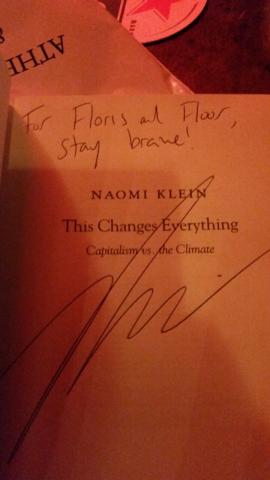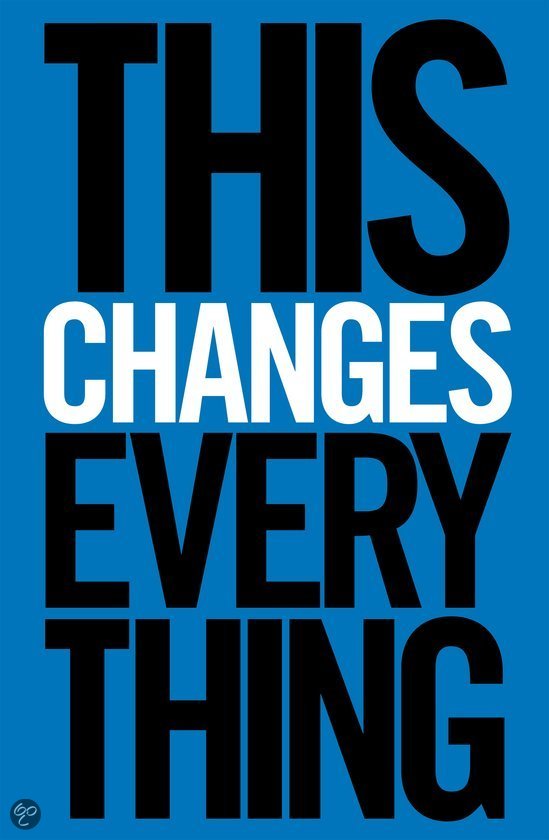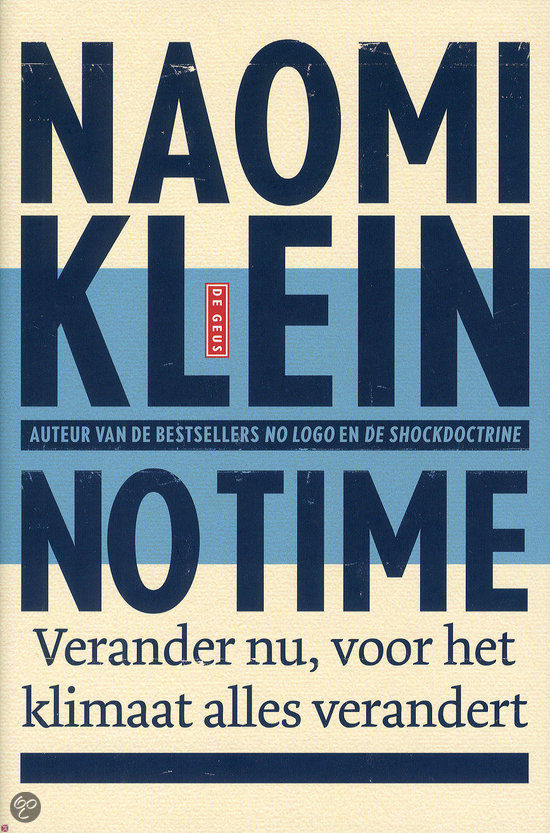
On November 25 we visited a special evening with Naomi Klein, who talked about her latest book This Changes Everything and who was afterwards interviewed by Joris Luyendijk. In this short reflexive report I will summarize some of her key points and relate them to some of my own thoughts.
We’re heading, says Klein, towards a 4 to 6 degrees Celsius warming and if we stay on this road, everything changes in our physical world. If we want to counter this, we’ll have to change our economic system. The climate crisis landed in our leap in the late eighties, when for instance greenhouse gasses became known of. And at that time, there were genuine efforts to work together and come up with solutions. ’88 was the first year that governments came together to discuss this. However, it was an epic bad timing, as a year later a script changing event took place, the fall off the Berlin Wall. The pensée unique became that history was over and that there was an evident victor in the story, the idea of neoliberalism. Neoliberalism systematically took the tools with which we could face the crisis out of the hands of our leaders, for instance in free trade deals. And so the current crisis remains unsolved. And it is an unfair crisis, caused by the richest countries while the impact is most felt by the poorest countries. We cannot, however, undo neoliberalism and go back to the pre-1988 era, as multinationals have supersized the American dream in the global distribution of their products. And yet, neither can we have a model that pursuits growth, no matter what.
At that point in Klein’s speech, I was reminded by a fairy tale my girlfriend wrote in 2003. We just left the Wold Social Forum in Porto Alegre and all of a sudden she insisted on buying a notebook to scribble down some of the ideas that started to grow in her head. From that moment, she was writing during the most part of our time spend in busses and on beaches. Every now and then she would show me a piece that she’d written, partly insecure about how I thought of it and partly triumphant of the twist she gave her story, that centered around a inn, its hosts and their visitors. So anyway, quite early in that fairy tale the visitors discuss the issue of growth. One of them was an advocate for growth for growth and pointed to nature and its survival of the fittest. Another disagreed, stating that all healthy creatures have a limit to their grow potential. If they exceed it, they die. Taking the energy to grow from the hands of others would make one dependent, not free. Remaining within your limits is the ultimate freedom. An interesting thought, and it came up while listening to Naomi Klein. Back to her now. According to Klein, there is a profound compartmentalization in activism. For instance, the anti-austerity protesters do not talk with climate scientists. But the climate change supersedes all other crises. We’re not at a deadline, we’re at a drop-deadline. We have to work together and we can’t afford to lose. And we can work together, as we have often expressed solidarity in the midst of crisis.
In the interview with Luyendijk, Klein took the opportunity to elaborate some of her points. She said you have to take care of systems if you want them to be resilient. But there’s no ambition to do this together, to be involved in the change. And that’s not very surprising either. You can’t explode someone’s worldview and then run away, thinking the other one will know what to do. But we need movements, not incidental actions. That’s why Klein hosts a website, www.thischangeseverything.org, that helps people get involved, shows many examples and links them, so that they’re not on their own. I for one see this compartmentalization too. There are so many social initiatives, but sometimes I wonder if they aren’t just as competitive – for funds, for attention, for the right to define, for prizes for the best idead – as the next neoliberal. Isn’t it also somehow human to impose your worldview onto others or at least to assume that theirs are the same as yours? Incidentally, the right to define is also a central theme in my girlfriends fairy tale. It goes as far as the privatization of language, the ultimate measure to silence critical voices and protest. But that’s another story.
Another issue that Klein discussed was her anger with centrists, which exceeds her anger with the right. There is a genuine climate change movement and it’s mostly fuelled by free-market think tanks. For obvious reasons, they can’t accept the scientist truth, for that would leave the door right open for the left to do anything and the right would collapse. Her anger is not so much with the people who deny the science, but with those who nullify the efforts to make a change, to an industry that attacks activists. We live, she stated, in an age that doesn’t believe in governing. Governments had the chance to make a change when they rescued the banks, but they didn’t. There is helplessness in the public, and its desire to take control of at least something explains upcoming populism. People feel despair because systems are unreceptive of them. Her message was, you can be overwhelmed by the scale of it all, or you can choose to be inspired.
There was also room for questions from the audience. Klein noted that it was the first time that she saw more women stepping up to the microphone than men. We also noted that there were only white folks in this audience, and wondered if Klein’s story, which is very inclusive in its sources, is channeled through various media and if the setting of this evening was thought to be the appropriate means to reach out to the white middle class. Any conclusion would be premature, however, so I’ll leave it by just noting.
Klein spun her story by answering to several questions at the same thing. One was about money. She said there is plenty of money, but it’s in large corporations and we need to get it back. This is where the government has to step in with tax legislations and, if necessary, nationalization of assets that were previously in the hands of the public. This made me reflect upon what nowadays is the ultimate buzzword, participation society (the Dutch equivalent of Big Society). Austerity measures are taken because the government is running out of money (there are other reasons as well, but for now let’s keep it simple). Citizens are ‘given responsibility’ or ‘expected to take responsibility’ or ‘challenged to take responsibly’ or whatever, but in the rhetoric of participation society, the suggestion is that this is a tête à tête between the government and its citizens. But why is the government running out of money in the first place? I think this is for a large part because it has reduced incomes from corporate taxes and increased spending on private contractors. It’s more complex than I sketch here, but I think corporations are the elephant in the discourse.
Klein concluded with a challenge to us. Slavery was abolished. It took courage and hard work and suffering, but it was abolished. In the 1920’s, the crisis was turned because large public investments were made. Were our ancestors, she asked, better organizers than we are? Were they more courageous? To turn this crisis around, it’s gonna take everyone. This isn’t about the line between activists and non-activists. We’re all in it. Thát is what changes everything. Now is not the time to take a next step. Now is the time to leap and run like a buffalo.
If you want to buy the latest book, just click on one of the covers.
And if you want to buy the fairy tale I mentioned, Bwazlazora (in Dutch), all you have to do is click on the cover.











